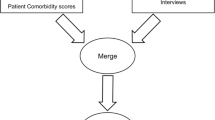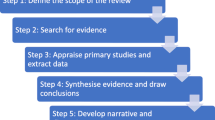Abstract
While strengths approaches are important to recovery-oriented practice, implementation can be challenging. This study implemented the strengths model of case management (SMCM) in 11 CM teams and assessed the fidelity of delivery and staff perceptions of the model after 36 months using the SMCM fidelity scale and the Readiness Monitoring Tool. Paired sample t-tests assessed change in fidelity from baseline to 36 months. Adjusted regression analyses compared survey responses of direct and management staff. While fidelity ratings significantly improved across all domains, at 36 months they remained suboptimal in supervision practices and use of model tools. Staff perceptions were generally positive but consistently lower for front-line than management staff. Implementing SMCM into existing case management practice with good fidelity is feasible. However, clear support from management may strengthen staff motivation and delivery. A review of practice later in implementation can flag challenges for sustainability and guide implementation support.
Similar content being viewed by others
Notes
While two of the three Quebec sites are funded and managed by the provincial government, they operate in different locations with different local management teams and so were considered separate organizations for this study.
References
Beidas, R. S., Stewart, R. E., Adams, D. R., Fernandez, T., Lustbader, S., Powell, B. J., Aarons, G. A., Hoagwood, K. E., Evans, A. C., Hurford, M. O., Rubin, R., Hadley, T., Mandell, D. S., & Barg, F. K. (2016). A multi-level examination of stakeholder perspectives of implementation of evidence-based practices in a large urban publicly-funded mental health system. Administration and Policy in Mental Health and Mental Health Services Research, 43(6), 893–908. https://doi.org/10.1007/s10488-015-0705-2
Bond, G. R., & Drake, R. E. (2020). Assessing the fidelity of evidence-based practices: History and current status of a standardized measurement methodology. Administration and Policy in Mental Health and Mental Health Services Research, 47(6), 874–884. https://doi.org/10.1007/s10488-019-00991-6
Briand, C., & Menear, M. (2014). Implementing a continuum of evidence-based psychosocial interventions for people with severe mental illness: Part 2-review of critical implementation issues. The Canadian Journal of Psychiatry. https://doi.org/10.1177/070674371405900403
Brown, J., Rounthwaite, J., & Barwick, M. (2011). Implementing evidence-based practices: A transformational organizational change process. International Journal of Knowledge, Culture and Change Management, 10(7), 33–53. https://doi.org/10.18848/1447-9524/cgp/v10i07/50010
Carlson, L., Goscha, R., & Rapp, C. (2016). Field mentoring: An important strategy for evidence-based practice implementation. Best Practices in Mental Health, 12, 1–13.
Deane, F. P., Goff, R. O., Pullman, J., Sommer, J., & Lim, P. (2019). Changes in mental health providers’ recovery attitudes and strengths model implementation following training and supervision. International Journal of Mental Health and Addiction, 17(6), 1417–1431. https://doi.org/10.1007/s11469-018-9885-9
Domlyn, A. M., Scott, V., Livet, M., Lamont, A., Watson, A., Kenworthy, T., Talford, M., Yannayon, M., & Wandersman, A. (2021). R = MC2 readiness building process: A practical approach to support implementation in local, state, and national settings. Journal of Community Psychology, 49(5), 1228–1248. https://doi.org/10.1002/jcop.22531
Fukui, S., Goscha, R., & Rapp, C. (2012). Strengths model case management fidelity and outcomes. Psychiatric Services, 63(7), 708–710.
Hayes, J., Andrew, F., & Cai, Li. (2007). Using heteroskedasticity-consistent standard error estimators in OLS regression: An introduction and software implementation. Behavior Research Methods, 39(4), 709–722.
IBM Corp. (2017). IBM SPSS statistics for windows (no. 25). IBM Corp.
Latimer, E., Aubry, T., Barrett, B., et al. (2022). Association between fidelity to the strengths model of case management and client outcomes: A quasi-experimental study. Psychiatric Rehabilitation Journal, in press
Latimer, E., & Rabouin, D. (2011). Soutien d’intensité variable (SIV) et rétablissement: Que nous apprennent les études expérimentales et quasi-expérimentales? (Case management for moderate need clienteles: What can we learn from experimental and quasi-experimental studies?). Santé Mentale Au Québec XXXV, I(1), 13–34.
Livet, M., Yannayon, M., Richard, C., Sorge, L., & Scanlon, P. (2020). Ready, set, go: Exploring use of a readiness process to implement pharmacy services. Implementation Science Communications. https://doi.org/10.1186/s43058-020-00036-2
Meyers, D. C., Durlak, J. A., & Wandersman, A. (2012). The quality implementation framework: A synthesis of critical steps in the implementation process. American Journal of Community Psychology, 50(3–4), 462–480. https://doi.org/10.1007/s10464-012-9522-x
Petrakis, M., Wilson, M., & Hamilton, B. (2013). Implementing the strengths model of case management: Group supervision fidelity outcomes. Community Mental Health Journal, 49(3), 331–337. https://doi.org/10.1007/s10597-012-9546-6
Rapp, C., & Goscha, R. (2012). The strengths model: A recovery-oriented approach to mental health services (3rd ed.). Oxford University Press.
Roebuck, M., Latimer, E., Bergeron-Leclerc, C., et al. Examining the working alliance as a mediator of the relationship between fidelity to the strengths model of case management and client outcomes, in a multiprovincial context. Psychiatric Services, in press
Salyers, M. P., McKasson, M., Bond, G. R., McGrew, J. H., Rollins, A. L., & Boyle, C. (2007). The role of technical assistance centers in implementing evidence-based practices: Lessons learned. American Journal of Psychiatric Rehabilitation, 10(2), 85–101. https://doi.org/10.1080/15487760701345968
Scaccia, J. P., Cook, B. S., Lamont, A., Wandersman, A., Castellow, J., Katz, J., & Beidas, R. S. (2015). A practical implementation science heuristic for organizational readiness: R = MC2. Journal of Community Psychology, 43(4), 484–501. https://doi.org/10.1002/jcop.21698
Schuetz, N., Mendenhall, A. N., & Grube, W. (2019). Strengths model for youth case management: Professionals’ perceptions of model impact on clients. Social Work in Mental Health, 17(4), 426–448. https://doi.org/10.1080/15332985.2018.1563024
Schuetz, N., Mendenhall, A. N., & Grube, W. (2021). Strengths model for youth case management: Impact on the provider and agency. Child and Adolescent Social Work Journal, 38(1), 43–55. https://doi.org/10.1007/s10560-020-00668-2
Scott, V. C., Kenworthy, T., Godly-Reynolds, E., Bastien, G., Scaccia, J., McMickens, C., Rachel, S., Cooper, S., Wrenn, G., & Wandersman, A. (2017). The readiness for integrated care questionnaire (RICQ): An instrument to assess readiness to integrate behavioral health and primary care. American Journal of Orthopsychiatry, 87(5), 520–530. https://doi.org/10.1037/ort0000270
Stirman, S., Kimberly, J., Cook, N., Calloway, A., Castro, F., & Charns, M. (2012). The sustainability of new programs and innovations: A review of the empirical literature and recommendations for future research. Implementation Science. https://doi.org/10.1186/1748-5908-7-17
Teague, G. B., Mueser, K. T., & Rapp, C. A. (2012). Advances in fidelity measurement for mental health services research: Four measures. Psychiatric Services, 63(8), 765–771. https://doi.org/10.1176/appi.ps.201100430
Tse, S., Tsoi, E. W. S., Hamilton, B., O’Hagan, M., Shepherd, G., Slade, M., Whitley, R., & Petrakis, M. (2016). Uses of strength-based interventions for people with serious mental illness: A critical review. International Journal of Social Psychiatry, 62(3), 281–291. https://doi.org/10.1177/0020764015623970
Tse, S., Ng, S. M. C., Yuen, W. Y. W., Fukui, S., Goscha, R. J., & Lo, W. K. I. (2019). Study protocol for a randomised controlled trial evaluating the effectiveness of strengths model case management (SMCM) with Chinese mental health service users in Hong Kong. British Medical Journal Open. https://doi.org/10.1136/bmjopen-2018-026399
Tsoi, E. W. S., Tse, S., Yu, C. H., Chan, S. K., Wan, E., Wong, S., & Liu, L. (2019). A nonrandomized controlled trial of strengths model case management in Hong Kong. Research on Social Work Practice, 29(5), 540–554. https://doi.org/10.1177/1049731518772142
Wandersman, A., & Scaccia, J. P. (2017). Organizational readiness: Measurement & predictor of progress final report.
Acknowledgements
We thank the people who participated in the study. We acknowledge the individuals who supported project implementation including Christian Méthot, Nhi Vu, Francois Neveu and staff at each of the study sites where the strengths model was implemented.
Funding
Funding was provided by Canadian Health Services Research Foundation (Grant No. 312666).
Author information
Authors and Affiliations
Corresponding author
Ethics declarations
Conflict of interest
There are no conflicts of interest to disclose for this study.
Ethical Approval
Ethics approval was obtained individually for each participating site in Ontario and Newfoundland, and centrally, as prescribed by the government of Québec, for sites in that province. Participants provided informed consent prior to the baseline interview.
Additional information
Publisher's Note
Springer Nature remains neutral with regard to jurisdictional claims in published maps and institutional affiliations.
Rights and permissions
About this article
Cite this article
Durbin, J., Aubry, T., Barrett, B. et al. Implementing the Strengths Model of Case Management: Assessing Practice Three Years After Initial Implementation. Community Ment Health J 58, 1535–1543 (2022). https://doi.org/10.1007/s10597-022-00968-0
Received:
Accepted:
Published:
Issue Date:
DOI: https://doi.org/10.1007/s10597-022-00968-0




